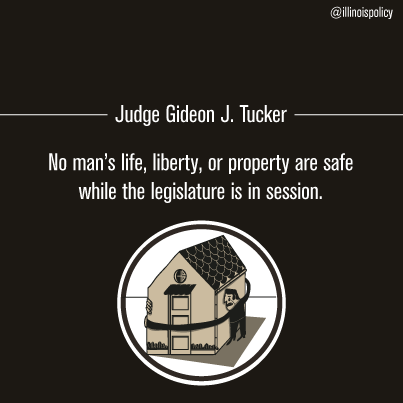QUOTE OF THE DAY
Reuters: Is Illinois getting weaker?
Illinois has queued up contestants for the governor’s race this fall. The New York Times reports:
Bruce Rauner, a multimillionaire businessman making his first run for political office, won the Republican nomination for governor of Illinois on Tuesday, setting up what is expected to be one of the nation’s most contested races for governor this fall.
Mr. Rauner, little known to Illinois voters before an intense run of television commercials, is expected to bring a serious challenge to Gov. Pat Quinn, a Democrat seeking a second full term in office. Although control of Springfield, the capital in President Obama’s home state, has been solely in the hands of Democrats for more than a decade, a fierce contest is anticipated, in part because of the economic picture in Illinois, given the state’s poor credit ratings and high unemployment rate compared to other states.
Crain’s: Madigan moves for millionaire surcharge
Illinois House Speaker Michael Madigan today is calling for an income tax surcharge on millionaires, raising the stakes amid hot fights over who should be governor and how to balance the state’s books.
In a statement and a news conference, the powerful speaker from Chicago said he will introduce legislation calling for a vote this November on a constitutional amendment to allow a 3 percent surcharge on individual income above $1 million.
Mr. Madigan said the measure, if approved by lawmakers and then in a referendum, would raise about $1 billion more a year for schools, being distributed to every Illinois district on a per-pupil basis in 2015.
Time: The Government Is a Hitman: Uber, Tesla and Airbnb Are in Its Crosshairs
The real losers are not just the next generation of innovators but also customers who lose out on more ways of getting what they need or want.
What the Invisible Hand of free-market innovation giveth, the Dead Hand of politically motivated regulation desperately tries to taketh away.
That’s the only way to describe what’s happening to three wildly innovative and popular products: the award-winning electric car Tesla, taxi-replacement service Uber, and hotel-alternative Airbnb. These companies are not only revolutionizing their industries via cutting-edge technology and customer-empowering distribution, they’re running afoul of interest groups that are quick to use political muscle to maintain market share and the status quo.
Like all of President Obama’s ideas and enthusiasms, the minimum wage law is not a new idea. It was first adopted in 1938. It never has been the foundation of American prosperity, or even a good way to fight poverty. Indeed, it does more to increase poverty than reduce it.
Less than 3% of American workers are paid the minimum wage. These are not breadwinners supporting a family. Over half are between the ages of 16 and 24. Two-thirds (67%) of minimum wage earners work part time as secondary workers in middle class families earning an average of $53,000 a year, about the median income in America. Indeed, 62% of those earning the minimum wage are still enrolled in school.
About two-thirds (65%) of minimum wage earners live in families with incomes above 150% of the poverty line. Only 23% live in poverty. Just 4% of minimum wage earners are single parents supporting their family.
Reason: Spring Clean the Government
Spring cleaning is a healthy tradition. If only politicians did it!
They don’t.
When Barack Obama ran for president, he promised to clean house. “I’m not a Democrat who believes that we can or should defend every government program just because it’s there,” he said. “There are some that don’t work.”
Chicago Tribune: State Supreme Court strikes down eavesdropping law
The Illinois Supreme Court this morning struck down the state’s eavesdropping law, one of the strictest in the nation that made audio recording of any person, even in public, illegal unless that person gave their consent.
The court ruled that the law “criminalizes a wide range of innocent conduct.”
“The statute criminalizes the recording of conversations that cannot be deemed private: a loud argument on the street, a political debate on a college quad, yelling fans at an athletic event, or any conversation loud enough that the speakers should expect to be heard by others,” the court said in its ruling.
Crain’s: RTA sues three more towns in sales tax war
The Regional Transportation Authority has gone back to court in its still-expanding war against alleged sales tax havens that operate on the periphery of the agency’s area.
In an action filed late yesterday in Cook County Circuit Court, the RTA names far-suburban Genoa, Savanna and Morris, which it says struck deals with three fuel-oil companies to avoid paying the agency’s regional sales taxes. The RTA claims the companies located “sham sales offices” in the towns, which then agreed to rebate a portion of the taxes back to the companies.
The suit does not name a damage figure, but an RTA spokesman said the amount of revenue lost from PetroLiance, Palatine Oil Co. and Bell Fuels Inc. collectively is in the millions of dollars in recent years.
Real Time Economics: Real Weekly Pay Is Looking Weakly
According to Labor Department data out Tuesday, real weekly pay fell in December and has stayed down in the following two months. One reason for the drop was a decline in real hourly pay back in December when the nominal pay raises couldn’t keep up with inflation.
But another drag on pay has been the decline in the workweek, caused in part by weather-related plant closings and traffic disruptions. The February workweek shrank to the shortest reading since January 2011, another month that experienced extreme winter weather.
With about 60% of the U.S. workforce paid hourly, the loss of work time is a drag on personal income, offsetting the lift coming from job growth.
CARTOON OF THE DAY


